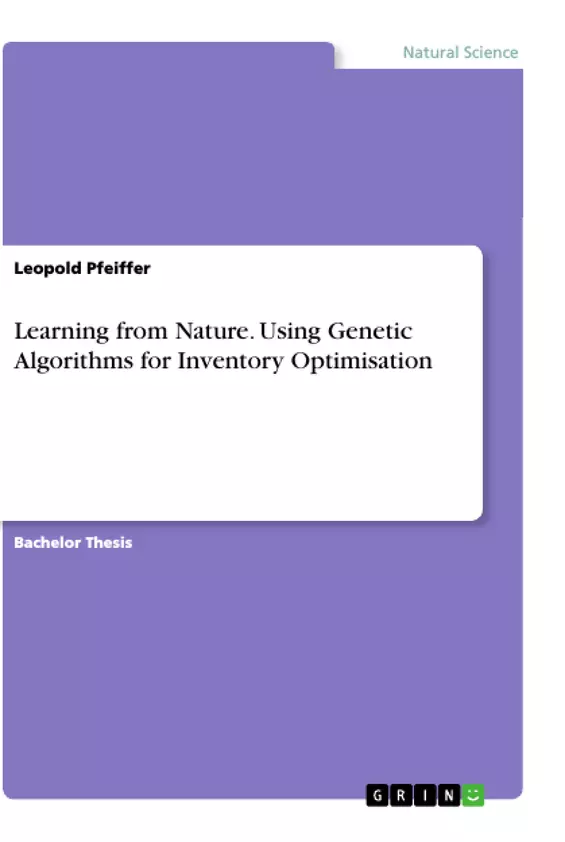A battery of approaches has been applied by researchers and practitioners in the field of inventory optimisation to find optimal inventory policies that can drive the success of businesses of various industries. One such approach is based on the use of genetic algorithms, a multi-purpose subclass of evolutionary algorithms that imitate the prin- ciples of evolution to solve combinatorial problems. In this thesis, we extensively explore the theoretical background of inventory optimisation as well as genetic algorithms before we develop a four-stage serial supply chain model and implement a genetic algorithm for base-stock level optimisation.
Inhaltsverzeichnis (Table of Contents)
- 1 Introduction
- 2 Literature Review
- 2.1 Literature on Serial Supply Chains
- 2.2 Literature on Genetic Algorithms
- 3 Description of the Serial Supply Chain Model
- 3.1 Model Assumptions
- 3.2 Mathematical Formulation
- 4 Theory of Genetic Algorithms
- 4.1 Optimisation Problem and Solution Representation
- 4.2 Iterative Process
- 4.3 Caveats and Limitations
- 4.3.1 Parameter Tuning
- 4.3.2 Multimodality
- 4.3.3 Convergence to the Global Optimum
- 5 Implementing a GA for Base-Stock Level Optimisation
- 5.1 Supply Chain Model Implementation
- 5.2 GA Implementation
- 5.2.1 Parameters
- 5.2.2 Iterative Steps
- 6 Empirical Testing
- 6.1 Parameter Tuning
- 6.2 Simulation Runs
- 7 Conclusion
Zielsetzung und Themenschwerpunkte (Objectives and Key Themes)
This thesis explores the use of genetic algorithms for inventory optimisation in a serial supply chain context. The primary goal is to develop and implement a genetic algorithm for determining optimal base-stock levels across multiple echelons of a supply chain, aiming to minimize total supply chain cost. This research examines both the theoretical foundations of inventory optimisation and genetic algorithms, and then applies these concepts to a real-world scenario.
- Inventory management in serial supply chains
- Application of genetic algorithms for optimisation
- Base-stock level optimisation
- Minimising total supply chain cost
- Practical implementation and empirical testing
Zusammenfassung der Kapitel (Chapter Summaries)
- Chapter 1: Introduction This chapter introduces the topic of inventory optimisation in serial supply chains, highlighting the importance of managing inventory effectively for business success. It explains the trade-off between customer service and inventory cost and discusses the role of supply chain networks in inventory control. The chapter also introduces the concept of genetic algorithms as a potential solution for inventory optimisation problems.
- Chapter 2: Literature Review This chapter provides a comprehensive review of existing literature on serial supply chains and genetic algorithms. It explores different approaches to inventory optimisation and discusses the advantages and disadvantages of various methods. The chapter also examines the theoretical foundations of genetic algorithms and their application in different fields.
- Chapter 3: Description of the Serial Supply Chain Model This chapter defines the structure and assumptions of the serial supply chain model used in the thesis. It provides a detailed mathematical formulation of the model, including the objective function and constraints.
- Chapter 4: Theory of Genetic Algorithms This chapter delves into the theoretical aspects of genetic algorithms, explaining the principles of Darwinian evolution and their application in the context of optimisation problems. It describes the iterative process of genetic algorithms, including the selection, crossover, and mutation operators. The chapter also discusses the limitations of genetic algorithms, such as parameter tuning and multimodality issues.
- Chapter 5: Implementing a GA for Base-Stock Level Optimisation This chapter combines the theoretical knowledge from previous chapters to implement a genetic algorithm for base-stock level optimisation in the defined serial supply chain model. It outlines the specific implementation details of the GA, including parameter settings and iterative steps.
- Chapter 6: Empirical Testing This chapter focuses on evaluating the performance of the implemented GA through empirical testing. It describes the parameter tuning process and presents the results of simulation runs, demonstrating the effectiveness of the algorithm in finding optimal base-stock levels.
Schlüsselwörter (Keywords)
This thesis focuses on the core concepts of inventory optimisation, serial supply chains, genetic algorithms, base-stock level optimisation, total supply chain cost, and empirical testing. These keywords represent the primary themes and research areas explored in this work.
Frequently Asked Questions
What is the main focus of this thesis?
The thesis explores the use of genetic algorithms (GAs) for inventory optimisation within serial supply chains to minimize total costs.
What are genetic algorithms in the context of this study?
Genetic algorithms are a subclass of evolutionary algorithms that imitate natural selection principles like crossover and mutation to solve complex combinatorial problems.
How is the supply chain modeled in this research?
It uses a four-stage serial supply chain model where the genetic algorithm is implemented to optimize base-stock levels at each stage.
What are the limitations of using genetic algorithms for inventory?
Key caveats include the need for careful parameter tuning, dealing with multimodality, and ensuring convergence to a global optimum rather than a local one.
How was the performance of the algorithm tested?
The algorithm's effectiveness was evaluated through empirical testing, simulation runs, and systematic parameter tuning.
- Quote paper
- Leopold Pfeiffer (Author), 2020, Learning from Nature. Using Genetic Algorithms for Inventory Optimisation, Munich, GRIN Verlag, https://www.grin.com/document/958671



